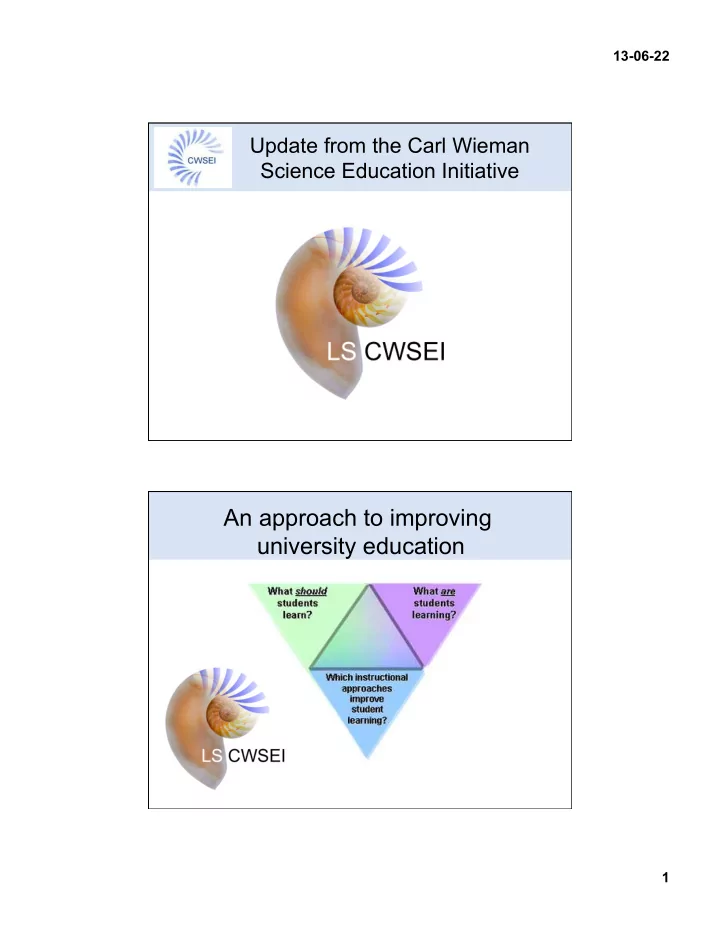

13-06-22 Update from the Carl Wieman Science Education Initiative An approach to improving university education 1
13-06-22 The LS-CWSEI team Dr. Bridgette Dr. Malin Clarkston Hansen Dr. Laura Dr. Lisa Weir McDonnell Dr. Megan Barker Dr. Mandy Banet The roles of an STLF 1. Help identify and implement best practices for teaching in Biology courses at UBC 2. Perform pedagogical research to obtain data to support evidence-based teaching practices 2
13-06-22 Implementing best practices BIOL 336 BIOL 230 Dr. Bridgette Dr. Malin Clarkston Hansen BIOL 204, 209 BIOL 234 Dr. Laura Dr. Lisa Weir McDonnell BIOL 112, 200, 201 Dr. Megan Barker BIOL 260, 361 Dr. Mandy Banet Implementing best practices 1. Learning objectives 2. Pre-reading assignments 3. Clicker questions 4. Worksheets 5. Tutorial activities 3
13-06-22 UBC Biology curriculum Biology 4 th Electives year 2 Biology lab 3 rd Biology Evolution Statistics courses (any year Electives topic) 2 organismal Cell biology Physiology diversity 2 nd courses with year Genetics Ecology lab 1 st year First year Biology courses UBC Biology curriculum Biology 4 th Electives year 2 Biology lab 3 rd Biology Evolution Statistics courses (any year Electives topic) 2 organismal Cell biology Physiology diversity 2 nd courses with year Genetics Ecology lab 1 st year First year Biology courses 4
13-06-22 Fostering active learning in lecture Clicker questions Pre-readings Invention activities Staged worksheets and in-class Group exams problems The roles of an STLF 1. Help identify and implement best practices for teaching in Biology courses at UBC 2. Perform pedagogical research to obtain data to support evidence-based teaching practices 5
13-06-22 Malin Hansen 1. Concept inventory for population dynamics 2. How to use analogies for effective learning 3. Changes in student attitudes to biology across the program Student attitudes survey • Survey administered to Biology students in 1 st and 4 th year • Do students respond as would an “ expert ” biologist? • Knowledge in biology consists of many disconnected topics • Reasoning skills used to understand Sample Survey biology can be helpful to my everyday life. • To learn biology, I only need to memorize Questions: facts and definitions • Mathematical skills are important for understanding biology 6
13-06-22 Student attitudes survey Percent expert-like 1 st year 4 th year Bridgette Clarkston • Identifying common misconceptions in genetics (comparison of UBC students vs. students in a MOOC) • Confronting teleological thinking in evolutionary biology • Utility of group exams 7
13-06-22 2-stage (group) exams • Students complete an exam individually and hand in • Get together in groups of four and work on the same exam • Hand in • Mark is a combination of individual score (75%) and “ The group exams give you a chance to go over group score (25%) your answers to the exam while you still care about the questions. ” Result: Greater learning gains when students tested in groups 8
13-06-22 Lisa McDonnell • Misconceptions in genetics (and comparison of UBC students vs. students in a MOOC) • Retention of conceptual knowledge vs. procedural skills in genetics • Characteristics of expert vs. novice problem solving behavior in genetics Laura Weir • Characterizing student challenges with constructing logical arguments in Biology • Efficacy of interventions targeting study skills • Integrating treatment of phylogenetics concepts across cources 9
13-06-22 Mandy Banet • Utility of targeted pre- reading assignments • Characterizing student challenges with constructing logical arguments in Biology Pre-‑reading ¡ • Most ¡students ¡do ¡not ¡prepare ¡by ¡reading ¡the ¡ textbook ¡before ¡coming ¡to ¡class ¡ • Ac9ve ¡learning ¡strategies ¡work ¡best ¡when ¡ students ¡are ¡prepared ¡and ¡already ¡familiar ¡ with ¡the ¡basics ¡of ¡the ¡material ¡ • How ¡can ¡we ¡get ¡students ¡to ¡read ¡before ¡ coming ¡to ¡class? ¡ • Use a targeted approach 10
13-06-22 Student ¡survey ¡data: ¡pre-‑readings ¡ 98% ¡of ¡the ¡students ¡report ¡ 82% of the students report reading the textbook on a taking ¡the ¡quiz ¡on ¡a ¡regular ¡ regular basis basis ¡ Student ¡mo@va@on ¡for ¡pre-‑reading ¡ When you did the pre-reading assignments, what MOTIVATED you to do so? “ I ¡learn ¡be)er ¡in ¡class ¡if ¡I ¡have ¡previous ¡knowledge ¡of ¡the ¡topic. ¡I ¡ find ¡that ¡I ¡pay ¡more ¡a)en<on ¡and ¡my ¡brain ¡can ¡make ¡more ¡ connec<ons ¡and ¡build ¡on ¡previous ¡knowledge. ” ¡ “ It's ¡for ¡marks ¡and ¡... ¡it ¡helps ¡me ¡to ¡dis<nguish ¡what ¡I ¡know ¡and ¡ what ¡I ¡have ¡troubles ¡with ¡so ¡I ¡can ¡be ¡all ¡ears ¡in ¡the ¡parts ¡where ¡I ¡am ¡ struggling ¡with ¡in ¡class. ” ¡ “ …so ¡if ¡I ¡have ¡any ¡ques<ons, ¡they ¡would ¡be ¡knowledgeable ¡and ¡well-‑ founded ¡ques<ons. ” ¡ 11
13-06-22 Megan Barker • Effectiveness of “ flipped classroom ” and “ blended learning ” strategies Group project – curriculum mapping Dr. Bridgette Dr. Malin Clarkston Hansen Dr. Laura Dr. Lisa Weir McDonnell Dr. Megan Barker Dr. Mandy Banet 12
Recommend
More recommend